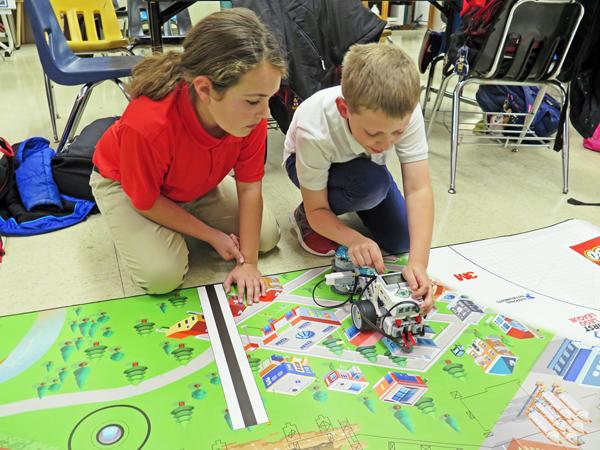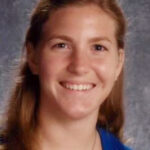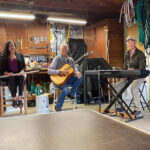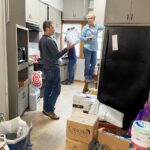By Anne Marie Amacher
The Catholic Messenger
Playing with Legos is something most kids enjoy doing. But some like to take it to the next level and get involved in First Lego League (FLL) in their schools. Two Lego programs are available — Junior FLL is typically for grades one through three and FLL is for grades four and up.

John F. Kennedy Catholic School fourth-grade students Addison Eckhardt and Damien Bright do a practice run is preparation for the First Lego League competition back in December.
Each year, FLL introduces a new theme for the season. “This year’s theme are hydro-dynamics, so all of the robot missions and team research project is focused on water,” said Leigh Johnson of Lourdes Catholic School in Bettendorf, who coaches an FLL team. Teams get to show off their work at regional and state competitions.
Competitions for the First Lego League were held in December at the Putnam Museum in Davenport. Lourdes’ Pumped Up team has advanced to state competition at Iowa State University this month.
Johnson explained that teams come up with an innovative way to solve a world problem related to the theme. Projects this year focused on how to find, transport and use or dispose of water.
Among the four areas the students are judged on is robot design. Judges look to see if the robot is sturdy, functional and consistent with running missions.
Student team members (no coaches) also do a team-building activity to see how cohesive the group is, and how well they work together under pressure. During a table match, teams have 2-1/2 minutes to run their robot missions and scoop up as many points as they can. They get three chances at the missions. FLL “builds a sense of community through the team environment while building on skills that can help with employability down the road,” Johnson observed.
“Each year, a real-world scientific topic is chosen as a challenge,” said Lori Brown, who coaches FLL at John F. Kennedy Catholic School in Davenport. “The students get a chance to research and learn about this topic, come up with real problems with it and develop a solution to solve their problem. The robots they program have to interact with a series of mission models that match that year’s theme. This introduces children to the need for STEM (Science, Technology, Engineering and Math) careers and the enormous variety of options that exist. It also gives them a head start on skills that can be used in a STEM career, or elsewhere.”
Brown noted that “Through their research, the children learn skills that they can use in their schoolwork and adulthood: citing sources, identifying legitimate research sources, organizing facts and public speaking. It also introduces children to basic programming concepts, the importance of being specific in your instructions and solving a big problem by breaking it into smaller parts.”
JFK is in its fourth year with FLL. “This year, we intended on having teams for first through sixth grades, and we were fortunate enough to have a couple 7th graders also willing to participate. Next year, I would like to offer it through 8th grade as well.” JFK had three Junior FLL teams and two FLL teams.
Brown and her husband, Adam, co-coach the junior and regular FLL teams. Patrick Smith provides assistance with both teams while Elisha Kubalsky helps with the junior team and Bev Askeland with the upper grades. Many parents also help during the season.
Lourdes has participated in FLL since 2011. This year, three of its teams competed: Team Rolling Thunder led by Steve Cotton and Matt Broyles, Team Savage Plumbers, led by Suzanne Broggini and Brandon Travis and Team Pumped Up, led by Johnson. The school does not have a junior team.
St. Joseph Catholic School in DeWitt is in its third year of a robotics program and the first year in FLL, said Principal Sharon Roling. “In the first two years, we participated in the FIRST Tech Challenge with high school teams and a few middle school teams. This was through a grant from the state of Iowa.”
St. Joseph offers a Lego club for students in kindergarten through sixth grade; FLL is open to grades six through eight. Donna Klostermann coaches the FLL team.
“We want to provide our students with every opportunity to experience the enjoyment of a STEM project,” Roling said. “STEM is not only about coding, but encompasses so many other facets of learning. Hopefully we can promote interest in STEM careers for both the girls and boys through student participation at all levels.”
With new legislation bringing computer science into the classrooms, Roling said STEM clubs/Lego League help to lay the groundwork for future curriculum. “By participating, students have the opportunity to be exposed and to get excited about the many facets of computer science.”
The cost of Lego supplies and other materials can create limits for many schools. Finding enough coaches and assistants can also be a challenge because of unfamiliarity with FLL requirements. At JFK, parents are expected to participate in one or two practices, Brown said. Lourdes has been blessed to have mentor coaches from Deere & Co.
At the junior level, FLL teams do research on their topic and create a “show me” poster on what they learned, what problems they found, what solution they came up with, and provide information about their team. They also program robots — little ones controlled with a computer tablet. Everyone gets an award.
What do the students think?
Lourdes eighth-grader Seth Derscha has participated in FLL for five years. He says the league gives him the opportunity to make new friends. Eighth-grader Mary Zude has participated for four years and enjoys Lego robotics because it strengthens her connection with others as well as her academic skills.
JFK sixth-grader Sean Brown said FLL is “an amazing experience. You get the chance to solve a world problem, you get to program a robot and have fun.” Fourth-grader Clara Nagel said she loves Legos. “We build a lot.” Her favorite activities are programming the robot and doing research for the project.
St. Joseph sixth-grader Eliza Petersen said, “I like the Lego League because I don’t get to play with Legos at home. The after-school club gives me an opportunity to work with the team. I especially like lining up the robot to successfully complete the mission. This is done after the coding is finished.”
Seventh-grader Sam Gravert enjoys FLL “because we have more freedom to build what we want in order to solve the problem.”











